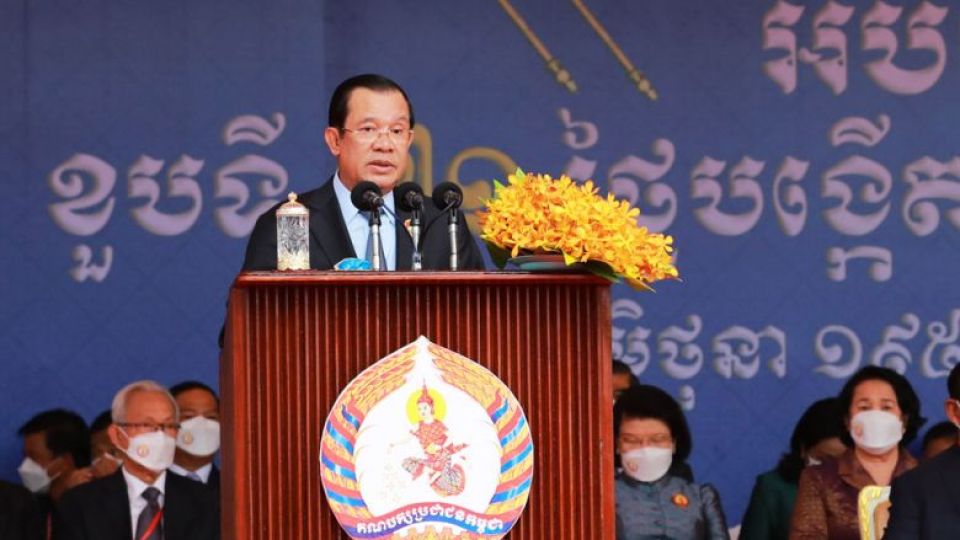September 15, 2022
PHNOM PENH – Prime Minister Hun Sen announced that he would remain the president of the ruling Cambodian People’s Party (CPP) even after stepping down in future, stressing that he would maintain the right to oversee the activities of his successor and Cabinet and may even remove any minister who is not up to the job.
Hun Sen declared his intention on September 13 while meeting with people who have volunteered to dismantle their houses and structures within the Angkor Archaeological Park in Siem Reap town and relocate to the Run Ta Ek development area in Banteay Srei district’s Run Ta Ek commune.
“Although I will leave the prime ministerial post, I will still serve as the CPP president. I have the right to oversee the activities of the prime minister and ministers. If they are not up to the task, I will remove them, period,” he said.
The premier noted that elections in Cambodia select a political party, and then the winning party appoints a prime minister.
Citing Britain, he said the British election first elect members of parliament from the various political parties. Then the members of the majority party elect a leader, as was the case with newly-minted UK Prime Minister Liz Truss.
“Once elected, she [Truss] did not go to the House of Commons. She went to meet Queen Elizabeth II –just hours before her passing – who accepted her as prime minister. She did not need to ask parliament for a vote of confidence,” he said, in response to unnamed critics.
“As for us, how are we different? The party with the most seats asks the King to appoint a prime minister. Upon appointment, the prime minister organises a Cabinet and asks the National Assembly [NA] for a vote of confidence,” he added, explaining the difference between the two systems in general and Cambodia’s constitutional monarchy in particular.
“[Truss] did not ask her parliament to give her a vote of confidence, why don’t you criticise Britain? I have to ask the NA for its authority. Without its vote of confidence, the appointment of a prime minister by the King is useless, it is worthless,” he said.
Hun Sen said one of his strengths that makes his rivals unable to win is that he is unpredictable, explaining that they have wrongly judged him and that even the CPP ranks have been unable to predict his next move.
In late 2021, his oldest son Lieutenant General Hun Manet – currently Deputy Commander-in-Chief of the Royal Cambodian Armed Forces (RCAF) and Commander of the Royal Cambodian Army – was officially endorsed by the CPP to run for prime minister in the future.
The premier reaffirmed that even if he personally stepped down, there would be no party other than the CPP holding power. No matter whose son Manet was, he still supports him as the next prime ministerial candidate – for he is qualified.
“It is not a matter of supporting my own son. I would support anyone who can lead the CPP, who can lead Cambodia. So don’t say that it’s all about Hun Sen’s son. If he is able to act as a prime minister, let him do. If my son was not qualified, I would not have endorsed his candidacy,” he said.
Yang Kim Eng, president of the People’s Centre for Development and Peace, said it is plausible that the ruling party holds sway, with power to influence the prime minister and Cabinet. However, he said ministers should be removed by the prime minister who directly oversees their works and performance.
“My only concern, if any, is that it could affect the implementation of national plans and programmes, as the ministers act on the orders of the prime minister – they fulfil their tasks according to plans and priorities,” he said.
“Chances are the ruling party does not monitor ministers’ activities as closely as the prime minister who directly oversees their works. So the party and prime minister may have different opinions as to their performance,” he elaborated.
Kim Eng added that the party’s influence over the prime minister could effectively serve as a tool to encourage hard work and ensure that the prime minister does not have absolute power within both the party and the government.
Kin Phea, director of the International Relations Institute at the Royal Academy of Cambodia, agreed that Hun Sen will remain party president even after leaving the prime ministerial post. He explained that in Cambodia’s political system, the party is very powerful, as the Kingdom uses a proportional electoral system. The president of any party has the right to oversee the performance of any party member, whether they are in the executive or legislative bodies.
“If he or she does not follow the party line, the party can oust them as it was the one that was chosen [through elections] – not the individual. Therefore, the party president is still very powerful thanks to a strong [political] influence over NA members who could offer a vote of no confidence in the prime minister and Cabinet at any time, as they are all subject to the influence of the party president,” he added.
If the CPP still holds power and Hun Sen is party president, then he still has power over other institutions which are under the leadership of the CPP, he added.


